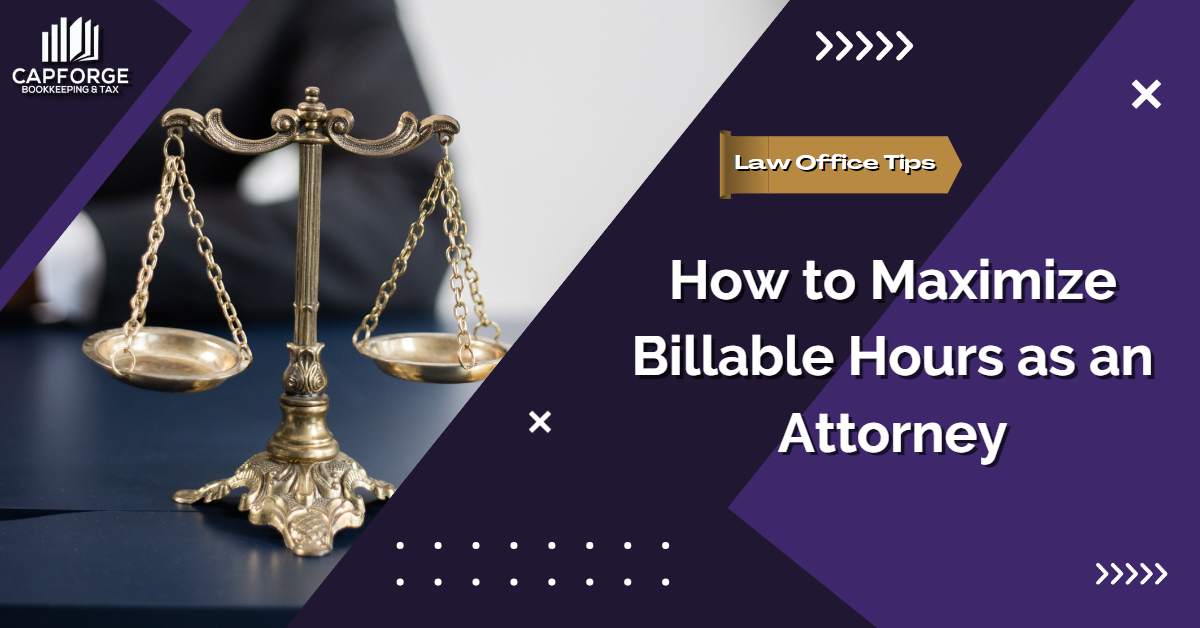How to Maximize Billable Hours as an Attorney
To succeed in legal practice, your goal should be to maximize billable hours as much as possible. While it’s important to provide quality legal services to your clients, it’s equally important to ensure that your time is efficiently spent to increase your revenue.
Accurate timekeeping ensures that attorneys are fulfilling their obligations to their clients and the legal system. It helps prevent overbilling and unethical practices, reinforcing the integrity and reputation of the legal profession. In this blog post, we’ll discuss how you can maximize your billable hours to help improve the profitability of your firm.
1. Avoid ‘block billing’
Block billing refers to a billing method where a lawyer or law firm combines multiple tasks or activities performed within a specific period and bills them as a single block of time. It’s basically a summary of various tasks that were completed during a particular period, such as a day or week, and assigns a total amount of time to that block.
Instead of relying on this old approach, a better way to charge clients is through itemized billing.
Itemized billing is widely regarded as a superior billing method compared to block billing for several fundamental reasons. This preference is based on the core principles of transparency, accuracy, client understanding, and ethical considerations.
With itemized billing, lawyers are encouraged to meticulously track their time for each task. This promotes accurate billing, reducing the risk of disputes or misunderstandings regarding billed hours. Lawyers can confidently defend their fees, knowing that they have a precise record of the work performed.
2. Delegate non-billable tasks
Non-billable tasks, such as administrative duties, managing emails, or handling routine paperwork, can be time-consuming and take away valuable hours that could be dedicated to billable tasks. That’s why proper delegation is crucial for attorneys to ensure they use the majority of their hours on profit-generating work.
To achieve this, consider hiring support staff as a first step. Legal assistants, paralegals, secretaries, and administrative personnel can handle routine administrative duties such as answering phone calls, scheduling appointments, managing emails, and document filing. These professionals are trained to perform these tasks efficiently, freeing up lawyers to concentrate on their legal expertise.
Additionally, you can also outsource non-billable tasks to third-party service providers. Law firms can contract with specialized firms or individuals for tasks such as bookkeeping, IT support, or marketing. Outsourcing allows law firms to access expertise without the burden of hiring full-time employees or investing in in-house infrastructure.
3. Use time-tracking software
Time-tracking software is a valuable tool for project management and resource allocation within a law firm. It allows law firms to assess which cases or projects are most profitable and where additional resources may be needed. This data-driven decision-making can lead to better resource allocation, improved profitability, and enhanced strategic planning for the firm.
Since lawyers often bill clients by the hour, it would be wise to utilize such software to ensure that clients are charged fairly for the work performed. This process also helps establish trust and credibility, as clients can review detailed records of the time spent on their cases. The level of transparency can lead to improved client satisfaction and reduced disputes over invoices.
By gaining insights into how time is spent, lawyers can identify opportunities to reduce non-essential tasks or delegate certain responsibilities. This, in turn, can lead to reduced stress, better work-life balance, and a more sustainable legal practice.
4. Automate redundant tasks
Time-tracking solutions aren’t the only digital tool you need to maximize your billable hours. There are plenty of tools that can help you automate routine tasks to free up more time to do profitable work. Document automation software is one example where attorneys can speed up document creation without sacrificing consistency and compliance with legal standards.
Moreover, document automation software facilitates collaboration among legal teams and with clients. Attorneys can work collaboratively on documents in real time, regardless of their location, which is especially valuable in today’s remote work environment.
Clients can also input necessary information into predefined templates, streamlining the intake process and reducing the back-and-forth communication required to gather essential details. However, the biggest benefit of document automation software is its built-in compliance checks, reducing the likelihood of errors that could prove costly (and time-consuming) to revise.
5. Focus on efficient communication
Effective communication is not just a fundamental skill for lawyers; it is the lifeblood of their practice, impacting every aspect of their work, from client relationships to courtroom success. That’s why collaboration tools are becoming more of a staple in every law firm to streamline workflows and improve overall efficiency in the legal profession
Collaboration tools provide a means to facilitate seamless communication, regardless of geographical distances. Video conferencing platforms, for instance, allow lawyers to hold face-to-face meetings with clients and colleagues, fostering a more personal connection even when physical presence is not possible. Secure messaging apps enable real-time communication, making it easy to exchange information, updates, and documents swiftly.
Clear communication is vital to ensure that all team members are aligned in their strategies and responsibilities. In large law firms or multi-practice areas, lawyers may also need to communicate with colleagues from different legal specialties to provide comprehensive client solutions.
In summary
Billable hours are vital to the legal profession because they underpin the financial health of law firms, promote transparency and trust with clients, facilitate self-improvement for lawyers, and establish a framework for performance evaluation and compensation.
While the billing process may sometimes be criticized for its potential to incentivize excessive work or discourage efficiency, it remains an essential and widely accepted practice in the legal field, serving the interests of both attorneys and their clients.
Accurate bookkeeping is essential to maintaining the profitability of your firm. If you need help sorting your financial records, our team is here to help. Feel free to fill out the form below, and we’ll get in touch with you shortly.








